Unit 8It must belong to Carla section AGF-4C课件(共30张PPT)人教版九年级全册
文档属性
| 名称 | Unit 8It must belong to Carla section AGF-4C课件(共30张PPT)人教版九年级全册 |

|
|
| 格式 | pptx | ||
| 文件大小 | 1.4MB | ||
| 资源类型 | 教案 | ||
| 版本资源 | 人教新目标(Go for it)版 | ||
| 科目 | 英语 | ||
| 更新时间 | 2023-11-27 11:05:58 | ||
图片预览


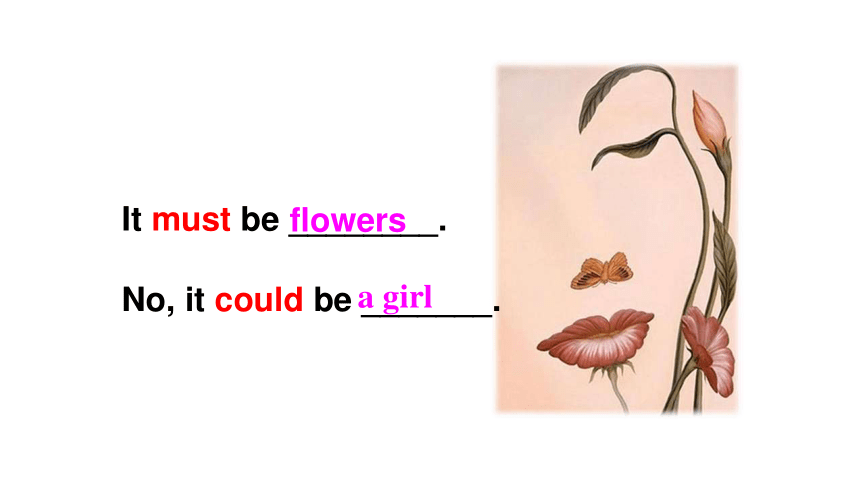
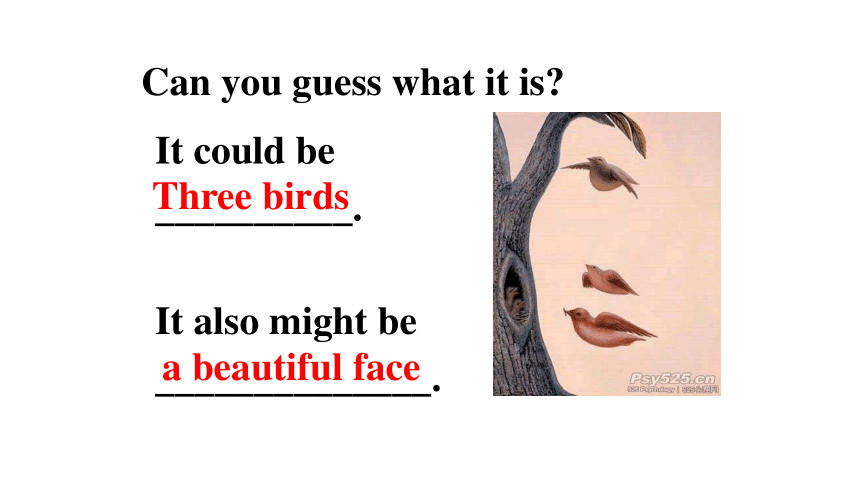
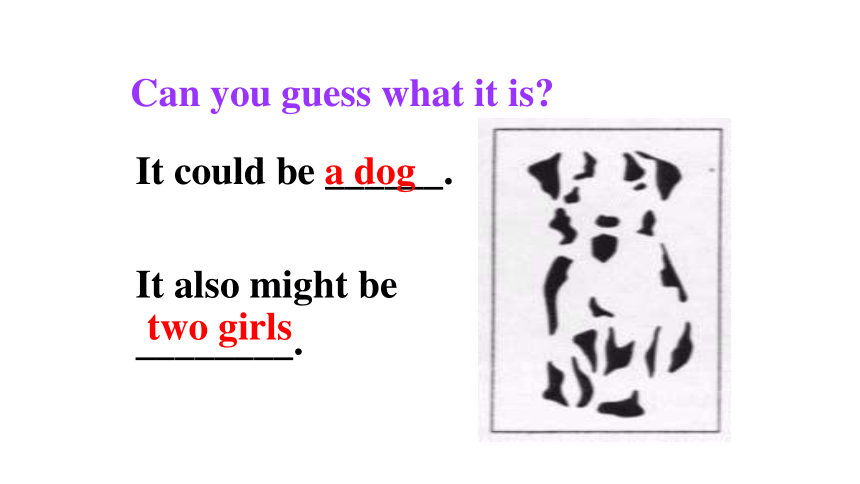
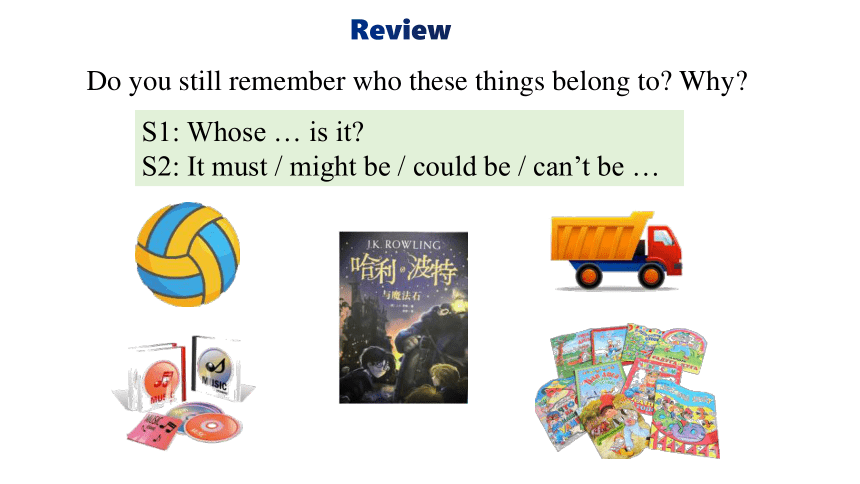
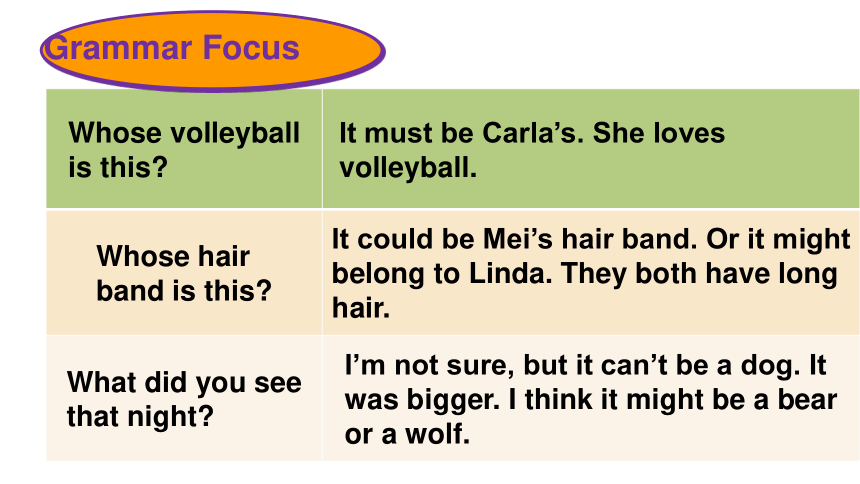
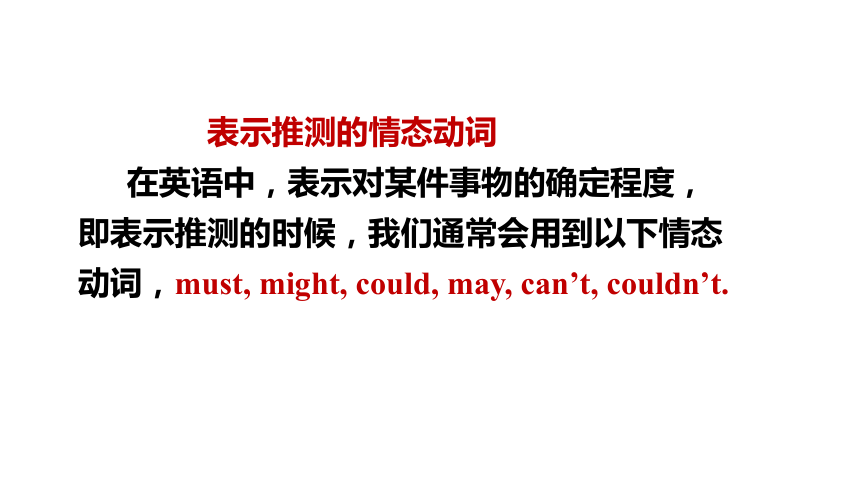
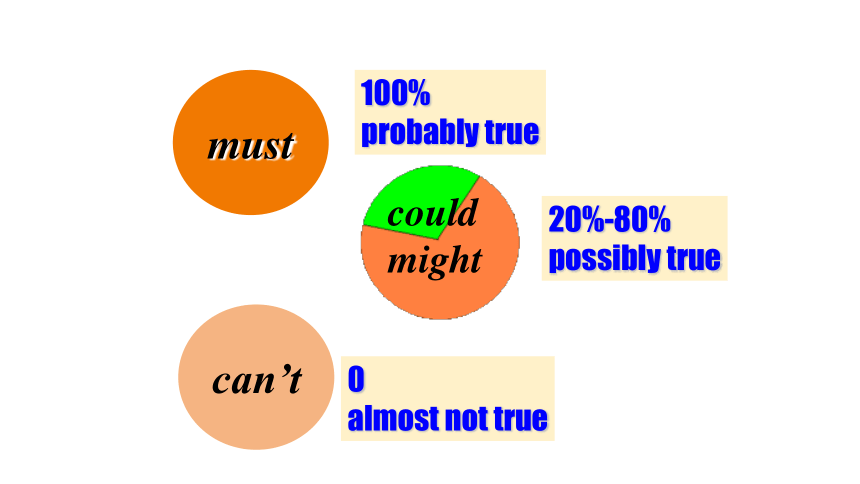
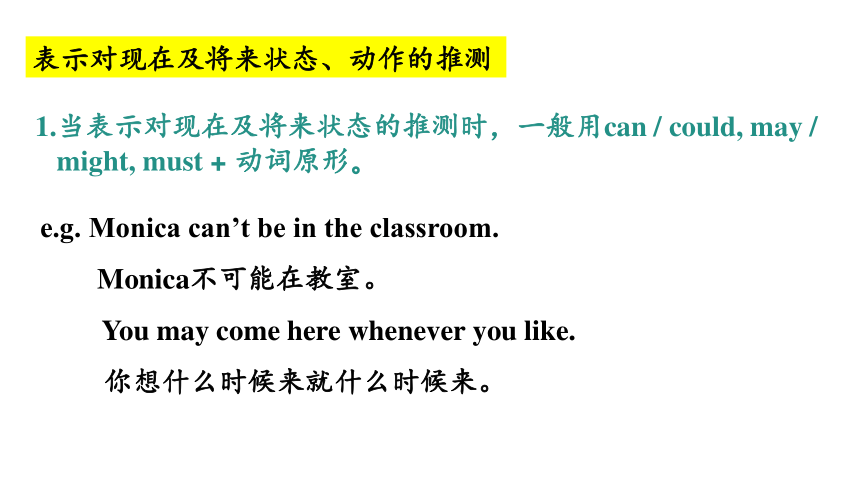
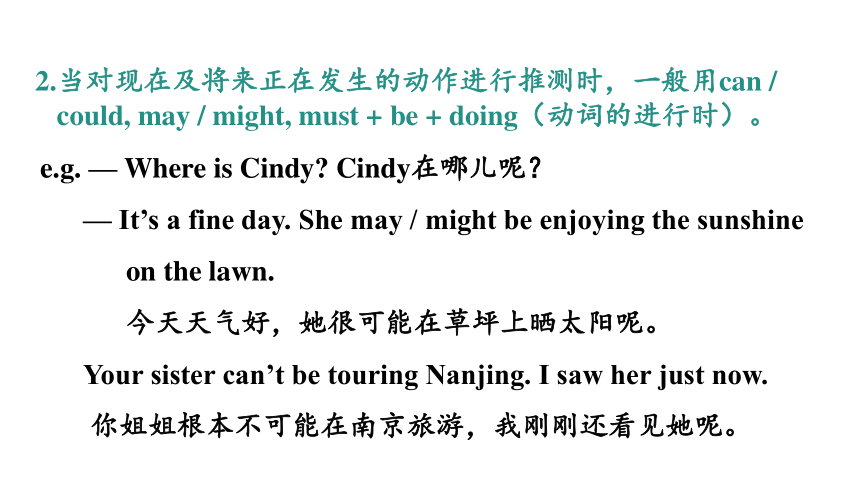
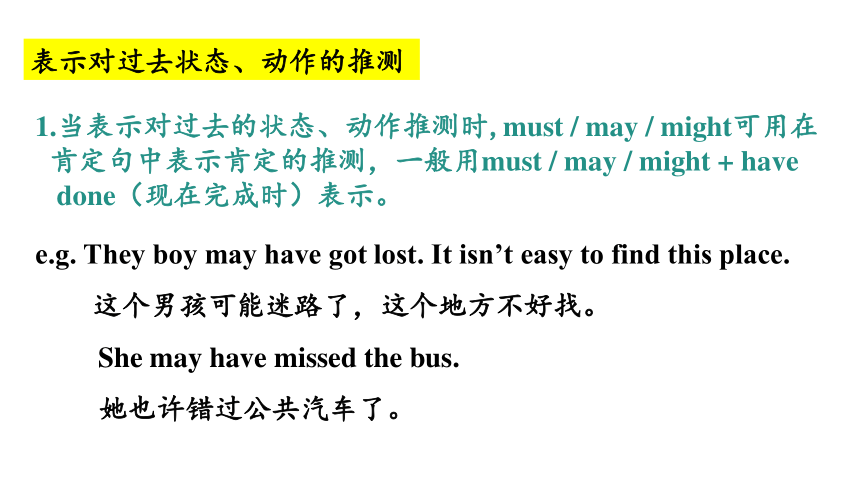
文档简介
(共30张PPT)
Section A (GF-4c)
Unit 8 It must belong to Carla.
Can you guess what it is
It could be ____________.
It also might be _________.
a white vase
two faces
Guessing game
It must be ________.
No, it could be _______.
flowers
a girl
It could be
__________.
It also might be
______________.
Can you guess what it is
Three birds
a beautiful face
It could be ______.
It also might be
________.
Can you guess what it is
a dog
two girls
Review
Do you still remember who these things belong to Why
S1: Whose … is it
S2: It must / might be / could be / can’t be …
Whose volleyball is this It must be Carla’s. She loves
volleyball.
Whose hair band is this It could be Mei’s hair band. Or it might belong to Linda. They both have long hair.
What did you see that night I’m not sure, but it can’t be a dog. It was bigger. I think it might be a bear or a wolf.
Grammar Focus
表示推测的情态动词
在英语中,表示对某件事物的确定程度,即表示推测的时候,我们通常会用到以下情态动词,must, might, could, may, can’t, couldn’t.
can’t
could
might
100%
probably true
20%-80%
possibly true
0
almost not true
must
表示对现在及将来状态、动作的推测
1.当表示对现在及将来状态的推测时,一般用can / could, may /
might, must + 动词原形。
e.g. Monica can’t be in the classroom.
Monica不可能在教室。
You may come here whenever you like.
你想什么时候来就什么时候来。
2.当对现在及将来正在发生的动作进行推测时,一般用can /
could, may / might, must + be + doing(动词的进行时)。
e.g. — Where is Cindy Cindy在哪儿呢?
— It’s a fine day. She may / might be enjoying the sunshine
on the lawn.
今天天气好,她很可能在草坪上晒太阳呢。
Your sister can’t be touring Nanjing. I saw her just now.
你姐姐根本不可能在南京旅游,我刚刚还看见她呢。
表示对过去状态、动作的推测
1.当表示对过去的状态、动作推测时,must / may / might可用在
肯定句中表示肯定的推测,一般用must / may / might + have
done(现在完成时)表示。
e.g. They boy may have got lost. It isn’t easy to find this place.
这个男孩可能迷路了,这个地方不好找。
She may have missed the bus.
她也许错过公共汽车了。
2. can / could用在否定句中表示否定的推测,一般用can / could
+ not + have done(现在完成时)表示对过去的状态、动作
的推测。此外,can / could还可用在疑问句中表示推测。
e.g. He can’t have forgotten. We were talking about it this
morning.
他不可能忘了,我们今天早上还说这事了。
There isn’t any water on the road. It can’t / couldn’t have
rained last night.
路上一滴水都没有,昨天夜里不可能下雨了。
句式 情态动词 意义 用法
肯定句 must
may/might/could
否定句 can’t/couldn’t
may not/might not
疑问句 can/could
一定;肯定
表示有把握的肯定推测
可能
表示不太有把
握的肯定推测
不可能
表示有把握的
否定推测
表示不太有把 握的否定推测
可能
表示推测
可能不
用法
must与have to的区别
have to比较强调客观需要,must着重说明主观看法。
另外have to能用于更多时态, 比较下面的句子:
We had to be there at 10:00.
有时两者都可以用, 意思差别不大。
We must have to leave now.
must在表示说话人对事物的推测时候要注意它,比may肯定得多, 相当于汉语的“一定”或“是”。(只有在肯定句中能这样用。)
This must be your room.
在回答由must引起的问题时, 如果是否定的答复,不能用mustn’t, 而需要用needn’t 或 don’t have to, 因为mustn’t是“一定不要”的意思。
1. — Whose book is this
— It must be Mary’s.
It must belong to Mary.
3. The hair band might belong to Linda.
might be Linda’s.
2. — Whose French book is this
— It could be Ali’s. She studies French.
4. The T-shirt can’t be John’s.
It’s much too small for him.
(肯定; 一定)
(可能)
(可能)
(不可能)
1. — Are you going to Beijing by plane
— It’s fast, but expensive. So I am not
sure. I ____ take a train.
A. should B. may C. must D. will
2. — Is John coming by train
— He should, but he ____ not. He likes
driving his car.
A. must B. can C. may D. need
Grammar Focus
1. 这是谁的排球
______ ________ is this
这一定是卡拉的。她热爱排球运动。
It _____ be _______. She loves volleyball.
Whose volleyball
must Carla’s
Fill in the blanks.
2. —这是谁的发带?
— ______ ____ ____ is this
—它可能是梅的发带。或者可能属于
琳达。她们两人都是长头发。
—It _____ be Mei’s hair band. Or it
_____ belong to Linda. They ____
have long hair.
could
might
both
Whose hair band
3. —那晚你看见了什么?
— _____ did you see that night
—我不确定,但肯定不可能是狗。它更大。我想也许是一头熊或一匹狼。
— I’m ___ ____, but it _____ ___ a dog.
It was bigger. I think it _____ ___ a bear or a wolf.
What
not sure
can’t be
might be
Choose the best way to complete each
sentence using the words in brackets.
1. A: Where’s Jean
B: I’m not sure. She ________ (is/
might be/ must be) in the laboratory.
might be
n. 实验室
4a
2. A: Everyone is going to the pool after school.
B: Really It _______ (must be / can’t be /could be ) hot outdoors.
must be
表示“位移”的动词用现在进行时态表将来,例如:go去,come来,leave离开,arrive到达,return 回来,fly 飞。
e.g. I am coming.=I will come.
He is leaving for Paris.=He will
leave for Paris.
adv. 在户外,在野外
3. A: That’s the phone.
B: Hmm. I wonder who it _______ (must
be / could be / should be).
could be
4. A: I wonder if there are Jim’s glasses.
B: They _______ (can’t be / might be /
could be) his. He doesn’t wear glasses.
can’t be
* wonder v. “想知道” (want to know)
No wonder + 句子,“难怪.....”
e.g. No wonder you are angry. 难怪你觉得生气。
5. A: I hear water running in the bathroom.
B: It ________________ (could be / must be / can’t be) Carla. She was thinking of taking a shower.
could be/ must be
* think of 想要;打算
e.g. I thought of playing basketball.
我想打篮球。
1. A: Many people are wearing coats.
B: The weather must be _____________
____________.
2. A: Sally has been coughing a lot.
B: She might be _____________________.
getting colder/ cold outside
having a sore throat/ ill
Complete these responses.
n. 外套
4b
3. A: This restaurant is always very
crowded.
B: The food ________________.
4. A: Whenever I try to read this book,
I feel sleepy.
B: It can’t _______________.
must be delicious
be that boring
adj. 困的
sleepy 形容词,意为“困倦的;瞌睡的”。既可作定语,也可作表语。
asleep 形容词,意为“睡着的”,只能作表语,不能作定语。fall asleep 意为“入睡”。
whenever 连词,意为“每当”时,引导时间状语从句;意为“无论何时;在任何时候”时,引导让步状语从句,相当于no matter when。
Look at this picture of a room. How much can you tell about the person who lives here Is it a boy or a girl What are his/her hobbies Discuss your ideas with a partner.
4c
A: It could be a girl’s room
because it’s very tidy.
B: I guess so. But it might be a
boy’s room because the
clothes look like boys’ clothes.
Exercises
单项选择
1. —Whose T-shirt is this
—It ______ be John’s. It’s ______ small for him.
A. can’t; much too B. can’t; too much
C. mustn’t; much too D. mustn’t; too much
2. — Where are you going this month
— We______ go to Xiamen, but we’re not sure.
A. needn’t B. must
C. might D. mustn’t
4. — Have you decided where to go for your
summer vacation
— Not yet. We _______ go to Qingdao. It’s a good place for
vacation.
A. may B. need C. must D. can’t
5. — Must I water the flowers now, mum
— No, you ______. You _____ do it later.
A. mustn’t; must B. mustn’t; may
C. needn’t; may D. needn’t; must
Section A (GF-4c)
Unit 8 It must belong to Carla.
Can you guess what it is
It could be ____________.
It also might be _________.
a white vase
two faces
Guessing game
It must be ________.
No, it could be _______.
flowers
a girl
It could be
__________.
It also might be
______________.
Can you guess what it is
Three birds
a beautiful face
It could be ______.
It also might be
________.
Can you guess what it is
a dog
two girls
Review
Do you still remember who these things belong to Why
S1: Whose … is it
S2: It must / might be / could be / can’t be …
Whose volleyball is this It must be Carla’s. She loves
volleyball.
Whose hair band is this It could be Mei’s hair band. Or it might belong to Linda. They both have long hair.
What did you see that night I’m not sure, but it can’t be a dog. It was bigger. I think it might be a bear or a wolf.
Grammar Focus
表示推测的情态动词
在英语中,表示对某件事物的确定程度,即表示推测的时候,我们通常会用到以下情态动词,must, might, could, may, can’t, couldn’t.
can’t
could
might
100%
probably true
20%-80%
possibly true
0
almost not true
must
表示对现在及将来状态、动作的推测
1.当表示对现在及将来状态的推测时,一般用can / could, may /
might, must + 动词原形。
e.g. Monica can’t be in the classroom.
Monica不可能在教室。
You may come here whenever you like.
你想什么时候来就什么时候来。
2.当对现在及将来正在发生的动作进行推测时,一般用can /
could, may / might, must + be + doing(动词的进行时)。
e.g. — Where is Cindy Cindy在哪儿呢?
— It’s a fine day. She may / might be enjoying the sunshine
on the lawn.
今天天气好,她很可能在草坪上晒太阳呢。
Your sister can’t be touring Nanjing. I saw her just now.
你姐姐根本不可能在南京旅游,我刚刚还看见她呢。
表示对过去状态、动作的推测
1.当表示对过去的状态、动作推测时,must / may / might可用在
肯定句中表示肯定的推测,一般用must / may / might + have
done(现在完成时)表示。
e.g. They boy may have got lost. It isn’t easy to find this place.
这个男孩可能迷路了,这个地方不好找。
She may have missed the bus.
她也许错过公共汽车了。
2. can / could用在否定句中表示否定的推测,一般用can / could
+ not + have done(现在完成时)表示对过去的状态、动作
的推测。此外,can / could还可用在疑问句中表示推测。
e.g. He can’t have forgotten. We were talking about it this
morning.
他不可能忘了,我们今天早上还说这事了。
There isn’t any water on the road. It can’t / couldn’t have
rained last night.
路上一滴水都没有,昨天夜里不可能下雨了。
句式 情态动词 意义 用法
肯定句 must
may/might/could
否定句 can’t/couldn’t
may not/might not
疑问句 can/could
一定;肯定
表示有把握的肯定推测
可能
表示不太有把
握的肯定推测
不可能
表示有把握的
否定推测
表示不太有把 握的否定推测
可能
表示推测
可能不
用法
must与have to的区别
have to比较强调客观需要,must着重说明主观看法。
另外have to能用于更多时态, 比较下面的句子:
We had to be there at 10:00.
有时两者都可以用, 意思差别不大。
We must have to leave now.
must在表示说话人对事物的推测时候要注意它,比may肯定得多, 相当于汉语的“一定”或“是”。(只有在肯定句中能这样用。)
This must be your room.
在回答由must引起的问题时, 如果是否定的答复,不能用mustn’t, 而需要用needn’t 或 don’t have to, 因为mustn’t是“一定不要”的意思。
1. — Whose book is this
— It must be Mary’s.
It must belong to Mary.
3. The hair band might belong to Linda.
might be Linda’s.
2. — Whose French book is this
— It could be Ali’s. She studies French.
4. The T-shirt can’t be John’s.
It’s much too small for him.
(肯定; 一定)
(可能)
(可能)
(不可能)
1. — Are you going to Beijing by plane
— It’s fast, but expensive. So I am not
sure. I ____ take a train.
A. should B. may C. must D. will
2. — Is John coming by train
— He should, but he ____ not. He likes
driving his car.
A. must B. can C. may D. need
Grammar Focus
1. 这是谁的排球
______ ________ is this
这一定是卡拉的。她热爱排球运动。
It _____ be _______. She loves volleyball.
Whose volleyball
must Carla’s
Fill in the blanks.
2. —这是谁的发带?
— ______ ____ ____ is this
—它可能是梅的发带。或者可能属于
琳达。她们两人都是长头发。
—It _____ be Mei’s hair band. Or it
_____ belong to Linda. They ____
have long hair.
could
might
both
Whose hair band
3. —那晚你看见了什么?
— _____ did you see that night
—我不确定,但肯定不可能是狗。它更大。我想也许是一头熊或一匹狼。
— I’m ___ ____, but it _____ ___ a dog.
It was bigger. I think it _____ ___ a bear or a wolf.
What
not sure
can’t be
might be
Choose the best way to complete each
sentence using the words in brackets.
1. A: Where’s Jean
B: I’m not sure. She ________ (is/
might be/ must be) in the laboratory.
might be
n. 实验室
4a
2. A: Everyone is going to the pool after school.
B: Really It _______ (must be / can’t be /could be ) hot outdoors.
must be
表示“位移”的动词用现在进行时态表将来,例如:go去,come来,leave离开,arrive到达,return 回来,fly 飞。
e.g. I am coming.=I will come.
He is leaving for Paris.=He will
leave for Paris.
adv. 在户外,在野外
3. A: That’s the phone.
B: Hmm. I wonder who it _______ (must
be / could be / should be).
could be
4. A: I wonder if there are Jim’s glasses.
B: They _______ (can’t be / might be /
could be) his. He doesn’t wear glasses.
can’t be
* wonder v. “想知道” (want to know)
No wonder + 句子,“难怪.....”
e.g. No wonder you are angry. 难怪你觉得生气。
5. A: I hear water running in the bathroom.
B: It ________________ (could be / must be / can’t be) Carla. She was thinking of taking a shower.
could be/ must be
* think of 想要;打算
e.g. I thought of playing basketball.
我想打篮球。
1. A: Many people are wearing coats.
B: The weather must be _____________
____________.
2. A: Sally has been coughing a lot.
B: She might be _____________________.
getting colder/ cold outside
having a sore throat/ ill
Complete these responses.
n. 外套
4b
3. A: This restaurant is always very
crowded.
B: The food ________________.
4. A: Whenever I try to read this book,
I feel sleepy.
B: It can’t _______________.
must be delicious
be that boring
adj. 困的
sleepy 形容词,意为“困倦的;瞌睡的”。既可作定语,也可作表语。
asleep 形容词,意为“睡着的”,只能作表语,不能作定语。fall asleep 意为“入睡”。
whenever 连词,意为“每当”时,引导时间状语从句;意为“无论何时;在任何时候”时,引导让步状语从句,相当于no matter when。
Look at this picture of a room. How much can you tell about the person who lives here Is it a boy or a girl What are his/her hobbies Discuss your ideas with a partner.
4c
A: It could be a girl’s room
because it’s very tidy.
B: I guess so. But it might be a
boy’s room because the
clothes look like boys’ clothes.
Exercises
单项选择
1. —Whose T-shirt is this
—It ______ be John’s. It’s ______ small for him.
A. can’t; much too B. can’t; too much
C. mustn’t; much too D. mustn’t; too much
2. — Where are you going this month
— We______ go to Xiamen, but we’re not sure.
A. needn’t B. must
C. might D. mustn’t
4. — Have you decided where to go for your
summer vacation
— Not yet. We _______ go to Qingdao. It’s a good place for
vacation.
A. may B. need C. must D. can’t
5. — Must I water the flowers now, mum
— No, you ______. You _____ do it later.
A. mustn’t; must B. mustn’t; may
C. needn’t; may D. needn’t; must
同课章节目录
- Unit 1 How can we become good learners.
- Section A
- Section B
- Unit 2 I think that mooncakes are delicious!
- Section A
- Section B
- Unit 3 Could you please tell me where the restroom
- Section A
- Section B
- Unit 4 I used to be afraid of the dark.
- Section A
- Section B
- Unit 5 What are the shirts made of?
- Section A
- Section B
- Review of Units 1-5
- Unit 6 When was it invented?
- Section A
- Section B
- Unit 7 Teenagers should be allowed to choose their
- Section A
- Section B
- Unit 8 It must belong to Carla.
- Section A
- Section B
- Unit 9 I like music that I can dance to.
- Section A
- Section B
- Unit 10 You're supposed to shake hands.
- Section A
- Section B
- Review of Units 6-10
- Unit 11 Sad movies make me cry.
- Section A
- Section B
- Unit 12 Life is full of the unexpected
- Section A
- Section B
- Unit 13 We're trying to save the earth!
- Section A
- Section B
- Unit 14 I remember meeting all of you in Grade 7.
- Section A
- Section B
- Review of Units 11-14
